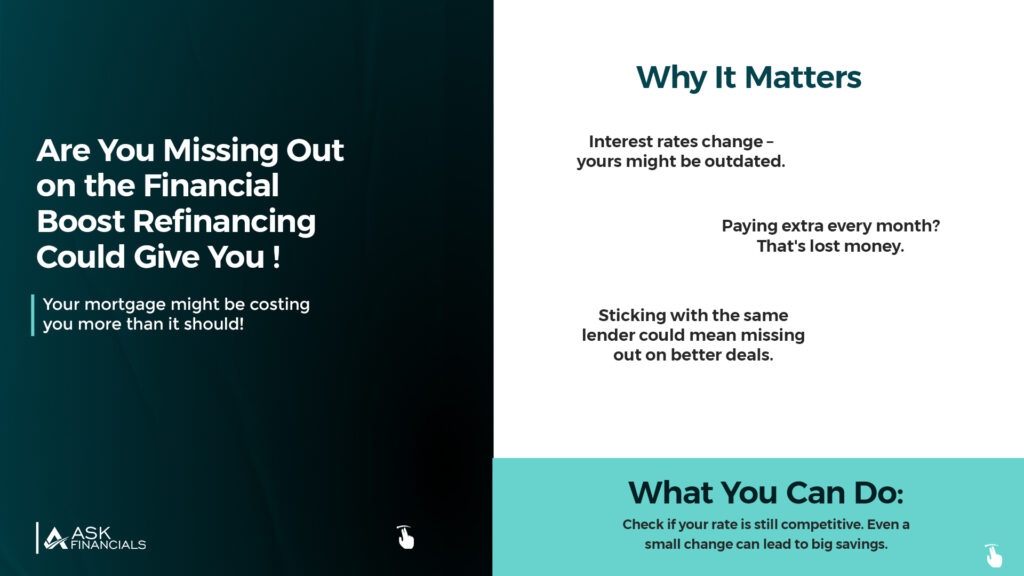Refinancing a mortgage is one of the most outstanding opportunities that homeowners can use to revisit the status of their financial standing, reduce expenditures, and rebalance their financial objectives. It covers some of the advantages and crucial elements of implementing this strategy for financial well-being. So, what is this about?
What Is Refinancing?
Refinancing involves replacing your old mortgage with a new one that typically offers better terms or occasionally a lower interest rate. Refinancing results in lower monthly payments, shorter loan durations, and the potential to access equity funds.
The Importance of Refinancing:
- Lower Interest Rate: A lower interest rate lowers the total cost of your mortgage over its lifetime.
- Better Loan Terms: Whether you choose a shorter term or a more comfortable payment schedule, refinancing gets your loan to match your needs.
- Use of Home Equity: Using equity to pay for home improvements or to pay off other loans can be a smart financial play.
How Refinancing Will Help Improve Your Financial Fitness
Refinancing helps you lower your mortgage payments and greatly impacts your overall fitness.
Here are some ways in which the refinance could benefit you.
- Less Monthly Payment: This refers to making smaller monthly payments on your mortgage.
- More Disposable Income: With fewer payments, you can save for the future or put the extra money into other financial goals.
- Flexibility in Spending: Lower housing costs open up space for other discretionary spending without affecting your budget.
➤Better Debt Management
Refinancing is a great time to roll all your high-interest debt, such as credit cards or personal loans, into one loan.
Consolidated Payments: All your financial obligations are rolled into one single monthly mortgage payment.
Lower Interest Expenses: Mortgage interest rates are significantly lower than most other debts, so the cost is reduced.
➤Enhanced Financial Security
Moving from a variable-rate mortgage to a fixed-rate mortgage offers predictability and stability.
Budget Certainty: Regular payments make budgeting easier.
Protection Against Rate Increases: Fixed-rate loans freeze your interest rate, safeguarding you against future increases.
Who Should Refinance?
There are various types of refinancing available, which can benefit all types of homeowners. Here is who may need it:
➤Borrowers with Improved Credit: A favorable credit score can qualify you for a better rate.
➤Extra funds: People may use the equity acquired due to refinancing to pay huge bills such as home remodeling or debt relief. Repayment.
➤High-interest rate homeowners: If you have previously fixed your mortgage at a high interest rate, refinancing is advisable.
Steps to a Successful Refinancing Process
- Analyze Your Existing Loan
The first thing required for finding refinancing opportunities is to know what an individual has in the case of the current mortgage terms, balance, and interest rate.
- Understand your loan statements-collect information about loan balance, interest rate, and payment history.
- Set Goals: Identify what you want to accomplish, such as lower payments, shorter terms, or cash access.
- Compare options
Shop around for refinancing to get the best rates and terms possible.
- Research Lenders: Use online tools or consult mortgage brokers to compare options.
- Pay attention to costs: Evaluate the total cost, including fees, to determine potential savings.
- Complete the Refinancing Application
Get all your documents ready, such as proof of income, credit history, and details of the property.
- Submit documentation promptly: Accurate and timely information facilitates the process.
- Wait for Approval: Go through the loan agreement after approval to make sure it will satisfy your needs.
Long-Term Refinancing Financial Benefits
Refinancing is not a temporary transition, but long-term refinancing impacts general financial stability.
- The building of wealth
As a result of reduced mortgage payments, finances become available for other investments or an emergency fund.
- Savings Growth: Those savings from then onwards, however, need to be funneled into interest-bearing accounts or invested in return-generating projects.
- Debt Reduction: Utilize excess cash to retire other debts more quickly.
- Retirement Planning
Lower mortgage expenses free up money to put toward retirement.
- Maximize Contributions: Freeing up more of your income can greatly boost your retirement savings.
- Early Payoff: Refinancing into a shorter term may allow you to pay off your house before retirement.
- Risk Mitigation
Consolidating debt and switching to a fixed-rate loan minimizes exposure to financial volatility.
- Stability in Uncertain Times: Fixed rates provide predictability, even during economic downturns.
- Simplification of Debt: Operating fewer accounts lowers the chances of missed payments or penalties.
FAQs
- How much can I save by refinancing?
Savings depend on many factors, such as the current rate, the balance of the loan, and the terms of the new loan. You can estimate potential savings using an online mortgage calculator.
- Are there costs related to refinancing?
Refinancing may include several kinds of fees: application, appraisal, and closing, among others. Being upfront makes your transaction transparent.
- Is it possible to refinance with a low credit score?
Though not impossible, options do exist for borrowers with less-than-ideal credit. Consult with a mortgage broker who will find the appropriate lenders.
- How does refinancing impact my credit score?
The credit query will result in a slight decrease in your credit score, but timely payments on your new loan can gradually improve it.
- Should I refinance into a shorter loan term?
While refinancing into a shorter term increases your payments, it also significantly reduces the overall interest paid, potentially saving you thousands of dollars.
- What is a cash-out refinance?
With this option, you’re borrowing against your home equity and receiving the cash as funds to cover such big expenses as debt consolidation or renovations.
Conclusion
Refinancing is such a crucial financial strategy that enables homeowners to reconsider their mortgage and work toward their financial stability. Refinancing reduces costs, consolidates debts, and even yields better long-term benefits. Therefore, refinancing serves as a valuable tool to strengthen financial stability. Expert opinion and research into available options will make the choice appropriate and fruitful.
Refinancing your mortgage can make a real difference to your financial situation. It could mean lower monthly payments, reduced debt, or extra funds for important goals. With ASK Financials, you get clear guidance from experienced professionals who make the process simple and straightforward. Our focus is on helping you make decisions that work best for you and your future. Take the opportunity to improve your financial position.
Book your appointment with ASK Financials today and see how refinancing could support your goals.


